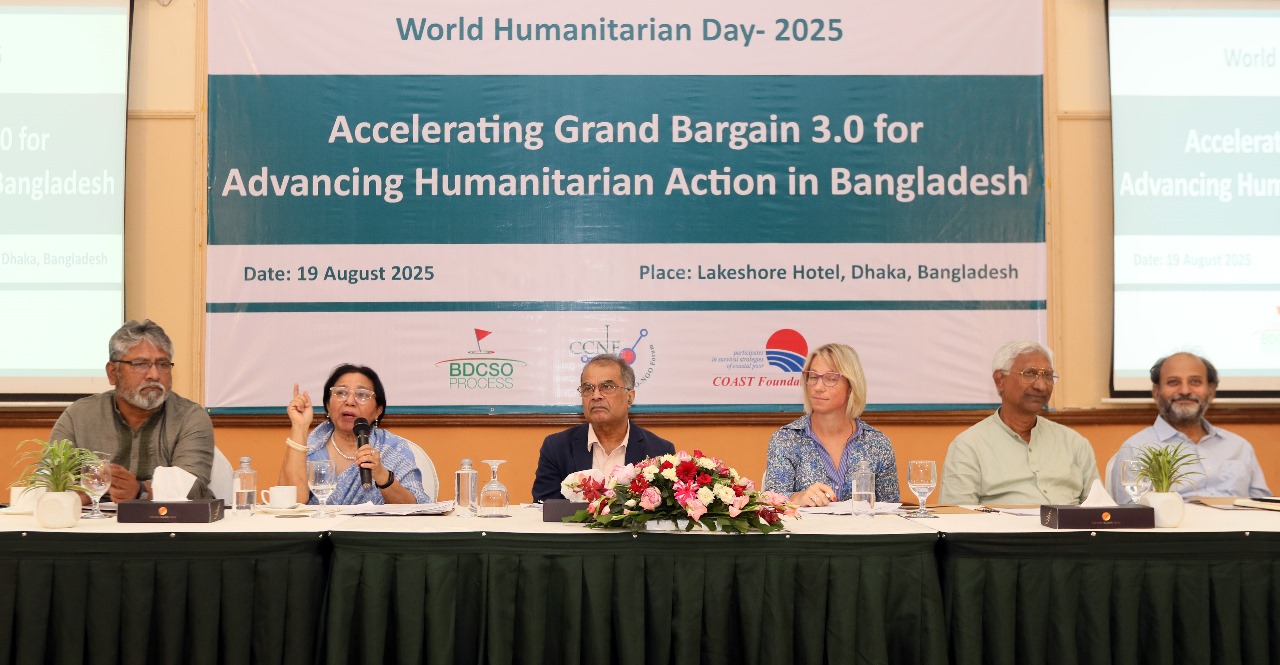02/28/2026

Humanitarian actors demand localization of aid in humanitarian response
Mostafa Kamal Akanda | Published: 2025-08-19 18:18:36

Humanitarian actors have called for an effective implementation of the Grand Bargain commitments in Bangladesh that includes localization of aid, quality funding to local national actors and accountability to the affected population.
The Grand Bargain commitment was adopted in Istanbul during May 2016 at the World Humanitarian Summit and signed by around 70 parties, including different donor countries, UN agencies, INGOs, etc., to advance humanitarian action.
Effective implementation of the Grand Bargain agenda at the country level requires a coordinated plan of the UN, INGOs and local humanitarian actors.
However, the speakers questioned the process of some INGO branches taking local registration and claiming themselves as local NGO, which is against the spirit of promoting the Grand Bargain localization agenda.
They said this during an international seminar titled “Accelerating Grand Bargain 3.0 for Advancing Humanitarian Action in Bangladesh” on Tuesday.
The seminar was organized by COAST Foundation, BDCSO Process and Cox’s Bazar CSO-NGO Forum.
The seminar was moderated by Rezaul Karim Chowdhury, Executive Director of COAST Foundation. The keynote presentation was delivered by Md. Iqbal Uddin of COAST Foundation.
Distinguished speakers included Matilda Svensson, First Secretary, Embassy of Sweden in Bangladesh; Shaheen Aman from MJF; Bjorn Hofmann, Senior Advisor of the Grand Bargain Secretariat in Switzerland; Gawhar Nayeem Warha from Disaster Forum; Sudhansu S. Singh from Humanitarian Aid International in India; Abdul Awal from NRDS; Sharif Jamil from Waterkeepers; Nuzhat Jabin from Christian Aid; Jasim Uddin from ADAB; Nasir Uddin from IRB; Mehedi Hasan Shishir from IFRC and Dulon Joseph Gomes from World Vision.
In his keynote, Md. Iqbal Uddin said that while Grand Bargain 3.0 is set to conclude in 2026, progress remains limited.
He urged donors and aid organizations to fulfill their commitments by ensuring at least 25% direct funding to local actors, providing multi-year and flexible funding, ensuring mutual accountability and support for local leadership.
Matilda Svensson highlighted that Sweden and SIDA are already providing 25% direct funding to local and national actors, fulfilling the Grand Bargain commitment.
She emphasized the need for signatories to build equitable partnerships and avoid subcontracting.
Shaneen Anam stressed that accountability and transparency apply equally to both donors and implementing organizations, underscoring the importance of ensuring aid reaches the right beneficiaries.
Bjoern Hofmann informed that the Grand Bargain Secretariat has circulated its Think Piece globally and that progress on commitments will be reviewed at the Annual General Meeting in October in Geneva.
Gawher Nayeem Wahra reminded that localization is not only about funding but also about the localization of resources.
Referring to the ALNAP study, Sudhanshu S. Singh noted that only 6% of funding currently reaches local actors directly, urging stronger support for them.
Awal cautioned that aid cuts put local actors at greater risk, but stressed the importance of being prepared for unforeseen crises and negotiating better terms with donors.
Additional speakers included Mainul Islam from NRC Bangladesh; Alauddin Al Noman from BRAC; Fadia Sultana from Mulsim Aid; AHM Bazlur Rahman from BNNRCl; Nilima Akther Chowdhury from AGRAJATRA; Mifta Naim Huda from CDIP; and Abdul Halim as a humanitarian expert, who shared insights on advancing localization of aid efforts in Bangladesh.
Editor & Publisher : Md. Motiur Rahman
Pritam-Zaman Tower, Level 03, Suite No: 401/A, 37/2 Bir Protik Gazi Dastagir Road, Purana Palton, Dhaka-1000
Cell : (+88) 01706 666 716, (+88) 01711 145 898, Phone: +88 02-41051180-81